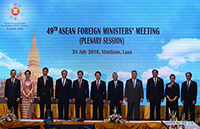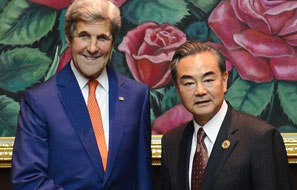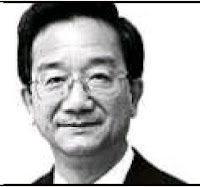 Foreign ministers of ASEAN member states and China at the ASEAN-China Ministerial Meeting in Vientiane, Laos. — VNA/VNS
Foreign ministers of ASEAN member states and China at the ASEAN-China Ministerial Meeting in Vientiane, Laos. — VNA/VNShttps://youtu.be/i_J3TQKTXcc
The 49th ASEAN Foreign Ministers' Meeting on Monday issued a joint communiqué, which didn't breathe a word about the South China Sea arbitration, or harbor any overt criticism against China. Although the South China Sea issue was mentioned many times in the communiqué, it only gave a general overview of principles that must be stuck to. Most foreign media view the communiqué as a triumph for China's diplomacy.
On the same day, a joint statement on how to effectively implement the Declaration on the Conduct of Parties in the South China Sea was issued.
The two statements reflect the consistent stand of ASEAN. Attempts at pressuring China through the ASEAN Foreign Ministers' Meeting have failed.
As the first foreign ministers' meeting after the so-called South China Sea arbitration award was issued, the US and Japan hoped to use the meeting in Laos to solicit ASEAN's collective support for the arbitration and impose unprecedented diplomatic pressure on China. But such expectations do not correspond with the realities in East Asia.
Hype was running high among American and Japanese media that only Cambodia was standing in the way of a joint statement that incorporates the South China Sea arbitration, and Laos as the host country didn't voice any firm opposition.
From another perspective, only the Philippines wanted a joint statement with reference to the arbitration, and Vietnam was not so persistent in its demands. Most ASEAN countries have maintained a neutral attitude. They neither want to see a division within the bloc, nor to be dragged into a conflict with China over arbitration.
Manila compromised this time, giving consent to a communiqué without mention of the arbitration. It showed flexibility compared with 2012, when the 45th ASEAN Foreign Ministers' Meeting ended with no joint statement because the Philippines' propositions over the South China Sea issue were firmly opposed.
It's in the common interests of China and ASEAN to maintain peace and stability in the South China Sea. But the US and Japan are willing to see conflicts between China and the Philippines and Vietnam escalate. If the arbitration leads to overall confrontation between ASEAN and China, it will fullfil the desires of the US and Japan.
ASEAN won't be so silly as to head toward a confrontation with China. We have carried out construction activities on islands and reefs in the South China Sea, but with our utmost efforts to avoid confrontation.
The possibility of a military solution to the South China Sea dispute has become smaller and smaller. The arbitration has brought about new risks. Instead of a clash between China and the Philippines, or China and Vietnam, there are more worries about conflicts being sparked between China and the US.
Under such conditions, it could never be ASEAN's desire to amplify the negative influences of the arbitration case. Two weeks after the arbitration result was announced, no other countries outside the region but the US, Japan and Australia have voiced support for it. The farce is coming to an end.- Global Times.
Political manipulation behind arbitral tribunal will be revealed
https://youtu.be/tUR7WVsmC7k
Spotlight: Chinese FM calls for end to politicization of South China Sea issue, urges parties to return to negotiations
Chinese Foreign Minister Wang Yi said on Tuesday that the political manipulation behind the arbitral tribunal will be revealed, in response to the comments made by some foreign ministers on the South China Sea arbitration case.
Wang expounded on China's position when attending the 6th East Asia Summit Foreign Ministers' Meeting held in the Lao capital Vientiane.
Wang said China has not participated in the arbitration case and will not accept the so-called ruling, a position that China has made clear since day one and is supported by strong legal basis.
By adopting this position, China is safeguarding the sanctity and impartiality of the United Nations Convention on the Law of the Sea (UNCLOS), said the Chinese foreign minister.
First, the arbitration unilaterally initiated by the former Philippine government violated the principle of having the consent of concerned parties as the basis of arbitration and failed to meet the prerequisite of conducting full exchange of views beforehand, thus lacking the legal conditions to be initiated.
What the former Philippine government had done also abandoned bilateral agreements between China and the Philippines and violated Article 4 of the Declaration on Conducts of the Parties in the South China Sea (DOC) as well as the principle of estoppel prescribed in international law, according to Wang.
Second, he said, the subject matters of the arbitration, however packaged, in fact directly concern territorial sovereignty and maritime delimitation which are beyond the scope of the UNCLOS and the jurisdiction of the ad hoc tribunal. It is a typical act of overstepping the power and ultra vires as well as the abuse of dispute arbitration mechanism.
Wang said by citing a prominent legal expert from Europe that the arbitration case undoubtedly touches upon territorial sovereignty which is not governed by the UNCLOS. The tribunal's practice of separating territorial sovereignty dispute with the status of islands and reefs is unseen in international law, which is like "putting the cart before the horse."
Third, the ruling of the ad hoc tribunal is full of obvious mistakes, Wang said. It blatantly uses its self-invented rules to negate and deprive the lawful and legitimate territorial sovereignty, maritime rights and interests of parties concerned. In particular, it says that Taiping Dao, the largest island in the Nansha Islands with an area of 500,000 square meters, is a rock and has no relevant maritime rights.
If such a judgment can legally stand, the sea map of the world will need to be redrawn, Wang said.
Wang stressed that this ruling runs counter to the spirit of international rule of law as well as the principle and spirit of the UNCLOS.
"This arbitration is imbued with question marks and fallacies in terms of procedure, legal application, fact finding and evidence gathering," he said.
The so-called ruling is illegal in three aspects: the initiation of the arbitration is illegal, the set-up of the tribunal is illegal, and the result of the arbitration is illegal. Therefore, China's stance is fully legitimate which serves the purpose of upholding international equity and justice and regional peace and stability, Wang said.
The Chinese foreign minister said more and more countries have come to see the nature and danger of the arbitration case, and understand and acknowledge China's stance to resolve disputes through direct negotiation and consultation, calling for respect to the rights of sovereign states to independently choose dispute settlement means including respecting the declaration on optional exceptions made under Article 298 of the UNCLOS.
There are also more and more legal experts around the world questioning the legality of the arbitration case and the fairness of the ruling, Wang said, noting that the illegal nature of the so-called South China Sea arbitration case and the political manipulation hidden behind the ad hoc arbitral tribunal will be further revealed. - Global Times
Related:
JOINT COMMUNIQUÉ OF THE 49th ASEAN FOREIGN MINISTERS' MEETING VIENTIANE, 24 JULY 2016 “TURNING ...
China, US vow to boost trust
https://youtu.be/QWWBD8osZKQUS agrees it's time to 'turn the page' on South China Sea
US Secretary of State John Kerry says in Laos that he will encourage Manila to pursue dialogue and negotiation with Beijing on the issue.
China-ASEAN exchanges go beyond the arbitration
The communiqué issued after the ASEAN foreign ministers' meeting in Laos, shows the two sides want to work together for regional stability and prosperity.
South China Sea arbitration turned a blind eye to UNCLOS, exceeded own competence and exposed tribunal’s ignorance
By now it’s a well-known fact that the South China Sea arbitration was unilaterally initiated by the[Read it]
Related posts
Political manipulation violates combined concept of fairness, justice,
rule, trend and direction. Congenial approach: China believes i...
In ignoring the verdict on the South China Sea, Beijing is following
precedents by great powers as no permanent member of the UN Securit...

Asean Foreign Ministers Meeting July 23~26, last ...
Jul 16, 2016 ... The Asean Foreign Minsters Meeting and the Post Ministerial Conference ... Laos should be given full support in preparing for the meetings.
















 Congenial approach: China believes in settling territorial issues and maritime delimitation disputes through amicable consultation and negotiation by directly concerned countries. In March 2005, national oil companies from China, the Philippines and Vietnam signed the Tripartite Agreement for Joint Marine Seismic Undertaking in the Agreement Area in the South China Sea.
Congenial approach: China believes in settling territorial issues and maritime delimitation disputes through amicable consultation and negotiation by directly concerned countries. In March 2005, national oil companies from China, the Philippines and Vietnam signed the Tripartite Agreement for Joint Marine Seismic Undertaking in the Agreement Area in the South China Sea.







